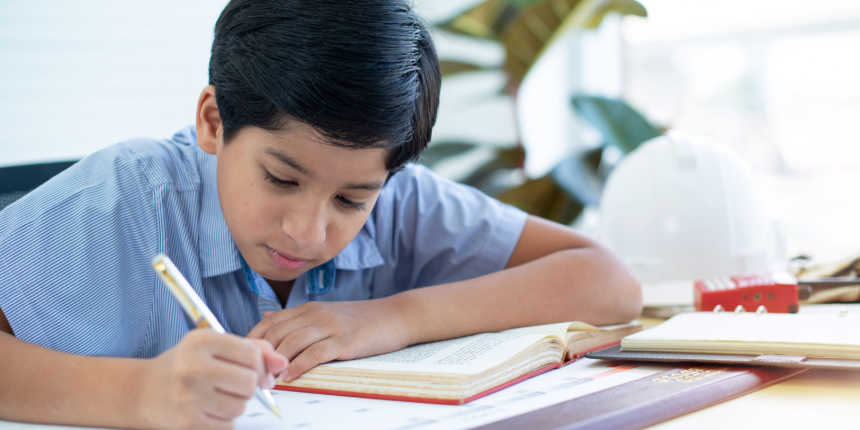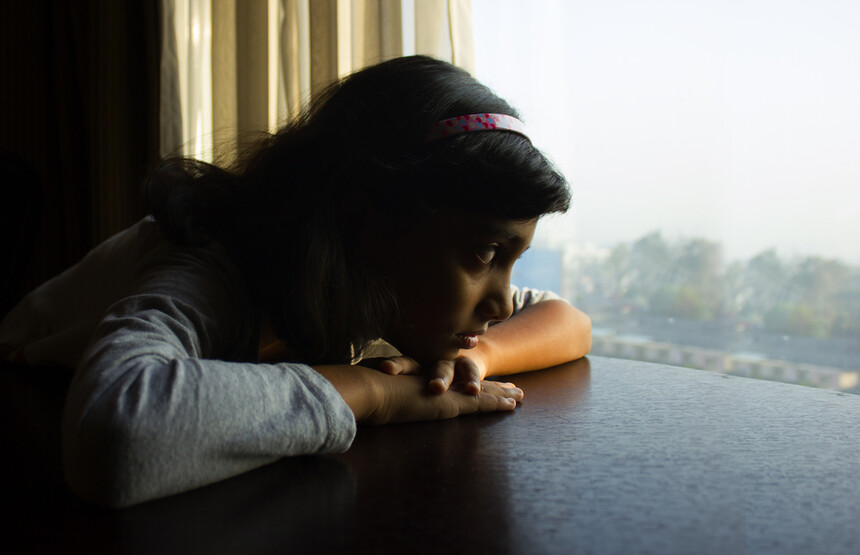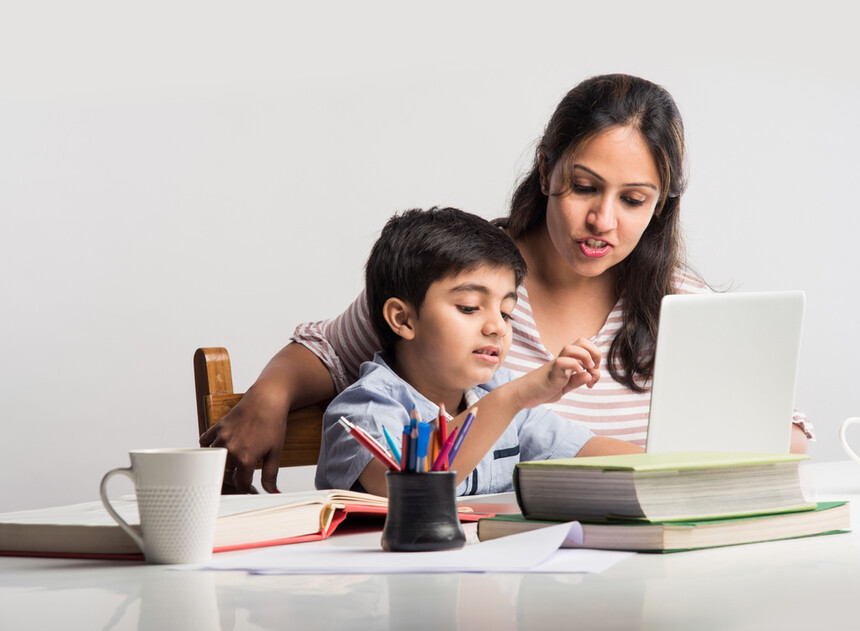Anxiety In School-Going Children: Signs, Types, Tips For Parents
Anxiety, according to the Oxford dictionary, is defined as a feeling of worry, nervousness, or unease about something with an uncertain outcome.

Anxiety is a natural human emotion that can have beneficial effects in situations that are stressful or potentially dangerous. It enables us to remain vigilant, recognise potential hazards, and encourages us to take action to solve problems. However, in this article, we are referring to the unhealthy, extreme, unmanageable, and acute form of anxiety that can leave one feeling incapacitated and unable to carry out daily tasks. This type of anxiety can be unhealthy and impact our ability to live a fulfilling life.
It's A Spectrum!
'Anxiety' is an umbrella term and what exactly a child is experiencing needs to be clinically assessed. A child could be facing mild anxiety, masking it well, and be functional; or moderate anxiety where they could be coping using some solutions (which may or may not be helpful); or severe and uncontrollable anxiety where medical intervention and therapy become essential. It is best to nip it in the bud and hence, early intervention is powerful and useful.
Also Read | From Being “The Good Child” To Being The Anxious Adult: Importance Of Emotional Freedom
Common Symptoms Of Anxiety
Let us first understand some common symptoms of anxiety, both in adults and children.
One of the major symptoms of anxiety is excessive fear or worry. It can become hard for children to breathe comfortably, sleep, concentrate, perform at academics, meet friends, play, or study if they feel consistently or recurrently anxious.
Some other common symptoms to watch out for are:-
- Fear, panic, restlessness, uneasiness
- Acute feelings of doom, danger, and harm
- Not being able to stay calm and still
- Shortness of breath
- Nausea
- Sleep problems
- Cold, sweaty, numbness, or tingling sensation in hands and feet
- Breathing quickly (hyperventilation)
- Dizziness, acidity, lack of appetite
- Rumination – thinking of a problem over and over again, unable to stop
 Rumination Is A Common Symptom Of Anxiety
Rumination Is A Common Symptom Of Anxiety
Anxiety Disorders
Now that we've understood the common symptoms of anxiety, let us also bring to our awareness some common anxiety disorders that escalation in the amount and frequency of anxiety felt by a person may lead to.
Separation Anxiety | Babies and toddlers feel scared and anxious when a loved one or primary caregiver leaves. Anyone can have separation anxiety. One may have negative thoughts that something bad may happen to your loved one.
Generalised Anxiety Disorder (GAD) | Excessive, unrealistic worry and tension with little or no reason. Daily living becomes challenging.
Obsessive Compulsive Disorder (OCD) | This includes patterns of unwanted thoughts and fears (obsessions) leading one to perform repetitive behaviours (compulsions) causing significant distress as it interferes with normal daily functioning.
Panic Disorder | Intense, overwhelming, uncontrollable feeling of acute anxiety where the individual believes they aren’t able to breathe, have chest pain, may feel dizzy and sweat excessively.
Post-Traumatic Stress Disorder (PTSD) | Anxiety that is triggered by a terrifying event. Flashbacks, nightmares, as well as uncontrollable thoughts about the event are common occurrences.
Social Phobia (Social Anxiety) | It is also called social phobia – when you feel an overwhelming worry and self-consciousness about everyday social situations.
Phobias | Intense fear of a specific object, situation, or thing that makes you feel anxious and fearful. Fear of heights, water, enclosed places, and snakes are some examples.
Selective Mutism | It's a type of social anxiety where young kids who speak and talk normally with their families do not speak in public places and at school.
Also Read | Helping Your teen through anxiety and depression
When Should Parents Worry?
Some of the behaviours that might indicate to parents that something might be off with their child are mentioned below.
School Issues | School refusal, incomplete school work, throwing up or visiting the loo before they leave for school, struggling to interact with teachers or peers at school, etc.
Health Issues | Not eating breakfast in the morning, sleep problems – nightmares and insomnia, often complaining about ‘not feeling well’, frequent headaches, stomach aches, etc.
Emotional Issues | Difficulty concentrating, increased tantrums and anger issues, increased irritability and emotional outbursts, disruption with friends and family, tension and fidgeting, excessive crying, and increased defiance.
 School Refusal And Incomplete School Work Might Indicate That Something Might Be Off
School Refusal And Incomplete School Work Might Indicate That Something Might Be Off
How Can Parents Help?
It is important that as parents we are aware and involved in the child’s life as many times they block and mask their symptoms and try to make us believe that all is well in their world.
Build Confidence | Help your child develop a secure sense of self and build confidence and rock-solid self-esteem that helps them through these crucial and formative years of personality development.
Be Aware | Be aware of your child’s routine, not just academic scores and grades but also of their interactions with friends, environment, stressors, and triggers.
Teach Healthy Coping | Help them express freely and identify healthy coping mechanisms that they can engage in to overcome their issues and problems.
Encourage | Build an equation with your child where you encourage them to share with you what their worries and concerns are and you share yours.
Share Experiences | Demonstrating how you cope with your own anxieties and concerns can be valuable. Rather than denying or hiding your stress, allow your children to witness how you navigate through difficult situations and turn them into opportunities for growth.
Acknowledge And Accept | Valuing and acknowledging your child's emotions, even if they differ from your own, is crucial. It is also essential to provide them with the necessary professional support and evaluations when needed, without perceiving them as inferior or inadequate. Doing so can strengthen your relationship with your child and foster a deeper connection.
Know When To Seek Intervention
If your child continues to show signs of anxiety for a prolonged period despite your sustained effort to help, do not hesitate to approach a professional and experienced mental health professional, preferably someone who is specialised in dealing with the age group your child belongs to. Seeking professional help when required will only help your child and you sail through smoothly through any emotionally problematic phases.
Also Read | Homeschooling: Are You Looking At It As An Option?
Nandini Raman is a Consultant Counselor; Corporate Trainer; and Columnist with a leading English newspaper. She contributes to a successful weekly column on career guidance and choices. With more than fifteen years of experience in the field, Nandini is guest faculty at many prestigious schools, colleges and training institutions. She is a hands-on parent to two teenagers.
Applications for Admissions are open.
As per latest syllabus. Physics formulas, equations, & laws of class 11 & 12th chapters
JEE Main Important Chemistry formulas
Get nowAs per latest syllabus. Chemistry formulas, equations, & laws of class 11 & 12th chapters
JEE Main high scoring chapters and topics
Get nowAs per latest 2024 syllabus. Study 40% syllabus and score upto 100% marks in JEE
JEE Main Important Mathematics Formulas
Get nowAs per latest syllabus. Maths formulas, equations, & theorems of class 11 & 12th chapters
